TikTok conspiracies, infertility myths and other disinformation hinder Central Valley COVID fight
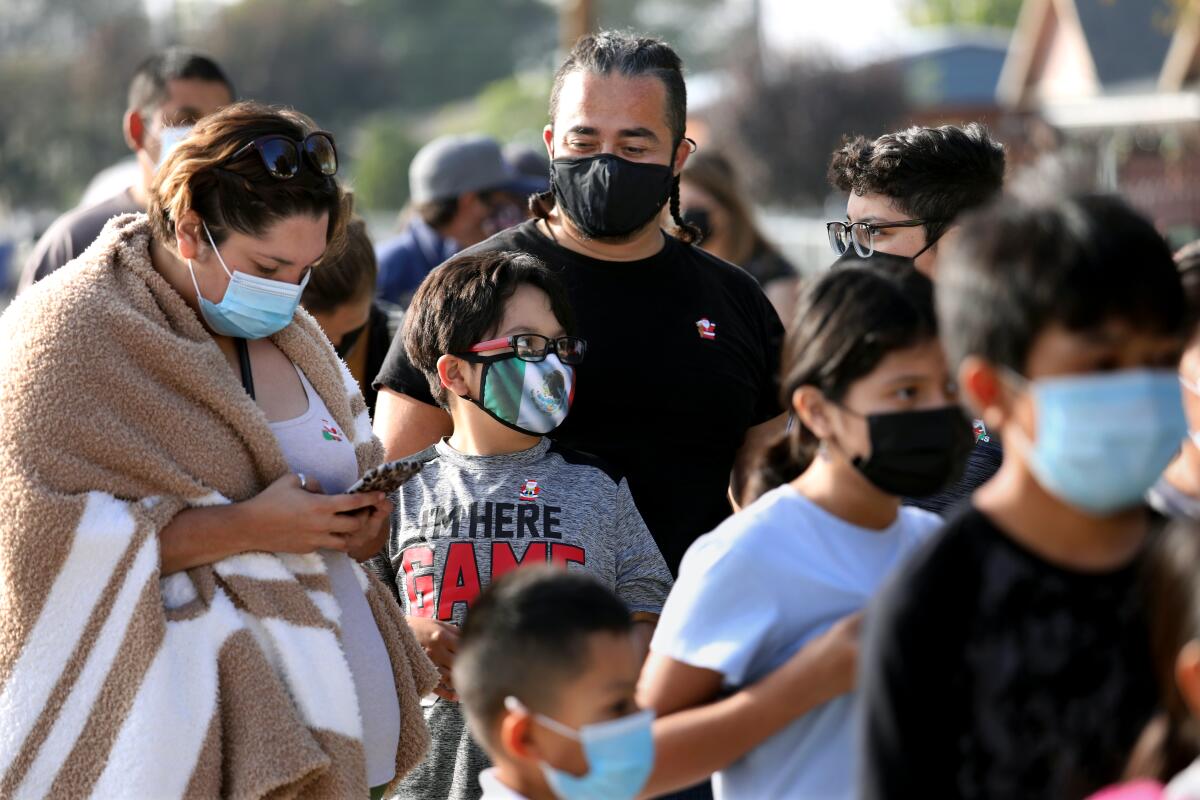
DELANO, Calif. â As Marissa Zendejas waited to get her first COVID-19 vaccination shot at the headquarters of the California Farmworker Foundation, the 27-year-old rattled off the tall tales she had heard from people she knows and the internet about why she shouldnât.
âLike, your life span gets short if youâre vaccinated,â Zendejas said. âYou only have this amount of time of life left. Or youâll get sterilized and wonât have kids no more.â
She laughed sheepishly and shook her head. âThere are a lot of things circulating, and people get scared.â
Nearby, Michael Rodriguez, 35, said he had seen on TikTok that the pandemic was a conspiracy created by the government. He got COVID-19 in February, but said the symptoms were mild.
Rodriguez needed clearance to watch Mexican regional music star Carin Leon perform in Bakersfield. His wife got vaccinated months ago, but he needed a negative test as proof of entry.
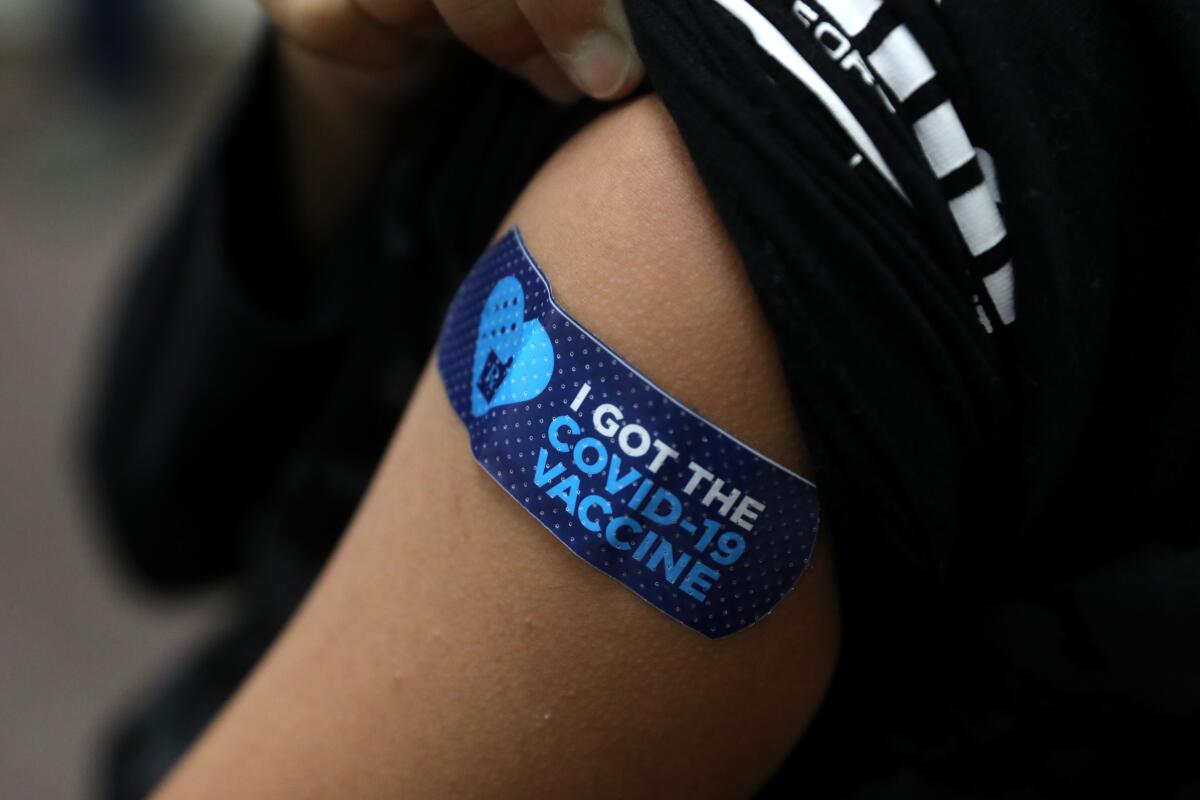
âIâm scared of vaccination because maybe something might happen to me,â he said. âThereâs videos of people who got the shot and got sick.â
The two showed up to the California Farmworker Foundation â but neither ended up taking the COVID-19 shot.
Zendejas was scheduling an appointment for her father and was going to sign up as well â until the same wave of uncertainty she had felt for all of 2021 washed over her and she backed out.
Such is the power of myth when it comes to getting the potentially lifesaving jab.
For the last year and a half, COVID-19 has pummeled the San Joaquin Valley like few regions in California. Kern County, which includes Delano, has one of the lowest rates of vaccination in California. While about 64% of Californians of all ages are fully vaccinated, only about 48% of Kern County residents are fully vaccinated. Overall, the demand for booster shots is lackluster, alarming public health officials that a winter surge is imminent.
The problem hasnât been the lack of available appointments or vaccinations. Public and private institutions have collaborated alongside nonprofits to provide testing, vaccinations and fact-based information about the pandemic, from the most blighted urban neighborhoods to the most idyllic agricultural fields.
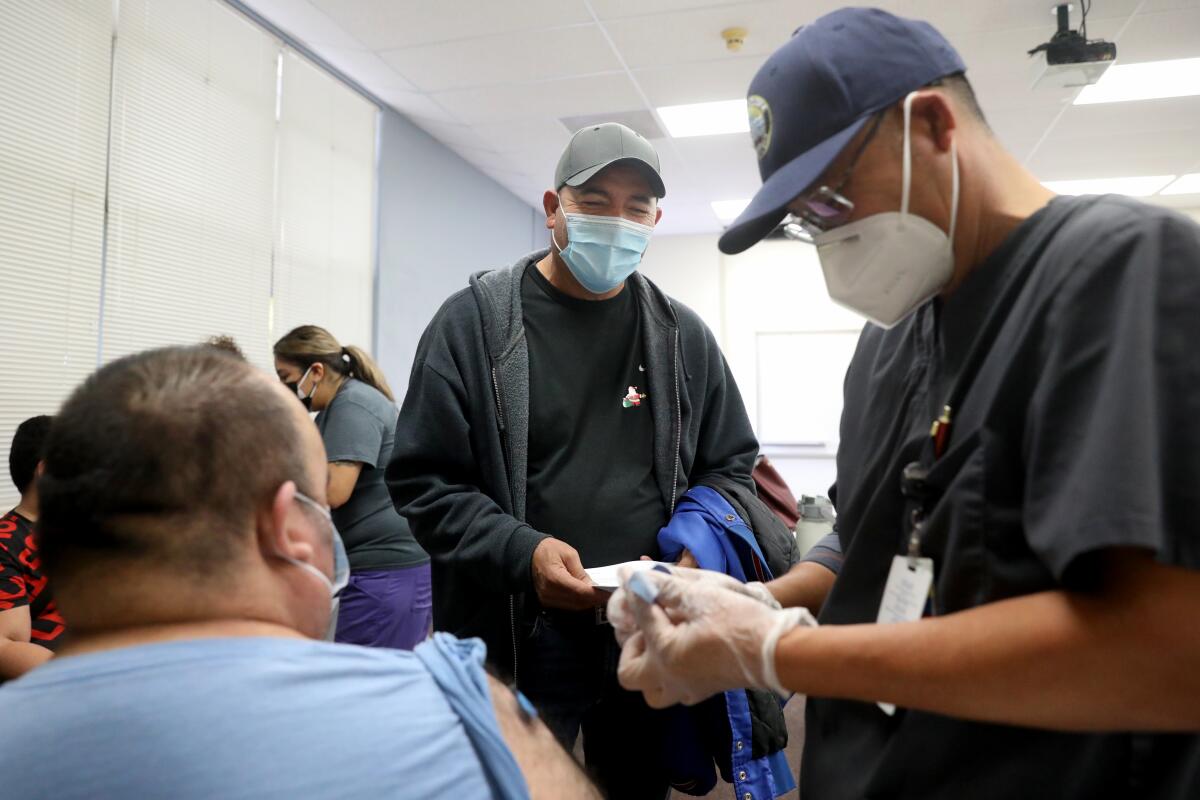
A visit to two separate testing and vaccination clinics hosted by the California Farmworker Foundation and the Delano Union School District offered glimpses into the real culprit: disinformation.
âI had one person tell me, âIf healthcare workers are willing to lose their jobs in order not to get the vaccine, what does that say for the people who are receiving it?ââ said Arnaldo Gonzalez, an outreach specialist at the California Farmworker Foundation who has collected anecdotal data on youth and vaccinations in Kern and Tulare counties for the last few months with plans to expand statewide.
What it boils down to, said Hernan Hernandez, executive director of the foundation, is âfear of the unknown.â But he pinpoints disinformation fueled largely by Facebook as one of the main culprits in a large swath of land already lacking in sufficient resources.
âYou hear something, you see something new every week,â he said. âThatâs just the reality. It hasnât stopped.â
For decades, the San Joaquin Valley has long suffered from health inequities exacerbated by poverty and its vastness. So when the pandemic first hit in 2020, health officials prepared for the worst â and yet were surprised by how bad it got, and remains.
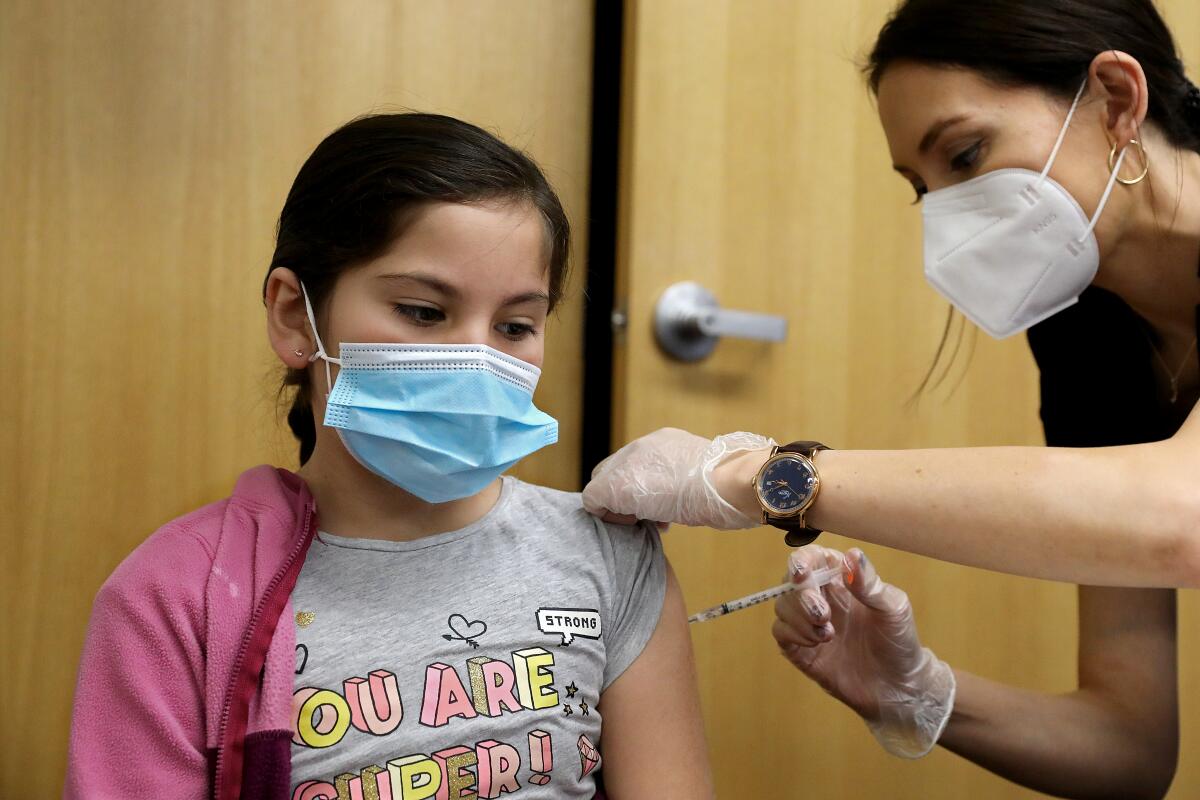
âWe really felt like this was going to be a hot spot from the get-go,â said Hernandez, who has overseen the foundation since 2016. âWe vaccinated tens of thousands of farmworkers here, but at the end of the day, itâs really what can government do for the future of this valley.â
To help curb disinformation, the California Farmworker Foundation developed a model where they hired farmworkers and paired them with farmworkersâ children who are recent college graduates. The two go into the field, job sites and neighborhoods to debunk myths through Q&As, first-person vaccination experience and fliers.
Hugo Morales, executive director and co-founder of Radio BilingĂźe, a national Latino public radio network that broadcasts in Spanish, English and Mixteco, said that many Latinosâ mistrust stems from a historical suspicion of a health system in Mexico that didnât always serve their interests. Morales said in Mexico there are also people who peddle false medical cures on the street.
âThatâs translated here to Facebook, where people post things that arenât effective or one that says people have died after taking the vaccine,â he said. âItâs not true, but thereâs a post somewhere.â
Many San Joaquin Valley residents who got tested at the nonprofitâs headquarters or attended a pop-up vaccination clinic at the Delano Union School District this month agreed. Several recounted the myths they heard from colleagues while working in the fields or from family members.
Those who said they didnât hesitate to get vaccinated had dealt with the virus firsthand or had family members die from the virus.
Facebook has long emphasized the strength of its efforts to contain misinformation targeted at Latinos and Spanish speakers. A whistleblowerâs leaks show employees raising alarms about the problem.
Enrique Cortes, 53, leaned against the railing in front of a Delano Union School District building, flanked by his younger brother and brother-in-law. The three stood quietly, wearing face masks, on a recent weekday afternoon as more and more people showed up to get their children vaccinated.
Although everyone in attendance wore masks, Cortes couldnât help but wonder whether those in line carried the virus. Men, women, children.
Cortes got COVID-19 in February. He said he was in the hospital for days, but the depression and anxiety over the virus dampened his spirit most. As a farmworker supervisor, he let the vaccine gossip rattle his nerves.
âMany of us have negative mindsets,â he said in Spanish. âWe are afraid, but we need to accept that this is happening and we need to protect ourselves.â
Cortesâ experience living through the virus solidified his belief that vaccinations can protect him and others. He escorted his younger brother to get his booster that day because he said he would have been too nervous to do so on his own.
His youngest son is vaccinated, but his adult daughter has pushed back against his pleas. He doesnât have the same influence over her because she lives on her own, he said.
âIf I could bring 10, 15 people with me, I would,â he said. âIâll bring as many people as I can. And I always ask, âDid you get it?â Itâs how I feel safe.â
The handful who showed up to the Delano school district building for their first sets of vaccinations did so on a whim. Diego Perez decided the night before that heâd join his two little girls who were now eligible for the vaccine when he saw a school flier about the event.
He nonchalantly told his girlfriend heâd take them and get it too. âMy girlfriend was happy for me â she was more excited than I was,â he said.
His two girls watched as their father, a 30-year-old tractor driver sporting a black beanie, chose his left arm to get the shot.
Perez had been skeptical, even though his childrenâs mother received the vaccine earlier this year. He said he had been swayed by âcrazy thingsâ he heard about the vaccine carrying a chip to track people.
âI thought, âIâll wait and see,ââ he said as he took a seat outside to wait his 15 minutes. âI wasnât sure. But at the end of the day, you do what you gotta do. Iâm committed.â
Itâs a pattern that has experts concerned and could have serious implications for how a coronavirus winter surge could spread through various regions of the state.
When vaccinations were available, Maria C. Garcia told herself sheâd give herself some time to mull it over. Then she realized she needed it because she wanted to travel to the Mexican state of San Luis PotosĂ, where she was born.
âThe thing is, we hear so many things,â Garcia said.
The grape picker said the majority of her colleagues in the fields have been vaccinated. They would regularly ask her when she would get hers. Her âsoon, soonâ eventually turned into âlater, later.â
After she got her shot, Garcia joined the others outside. Her cellphone rang and she immediately told someone that she had just got vaccinated. The person on the other end audibly gasped and Garcia chuckled.
She thought about putting off the flu shot. But just thinking about being felled and left out of work by that illness made her rethink procrastinating again.
âI guess,â Garcia said with a sigh, âIâll get that one, too.â
Times staff writer Rong-Gong Lin II contributed to this report.
More to Read
Sign up for Essential California
The most important California stories and recommendations in your inbox every morning.
You may occasionally receive promotional content from the Los Angeles Times.


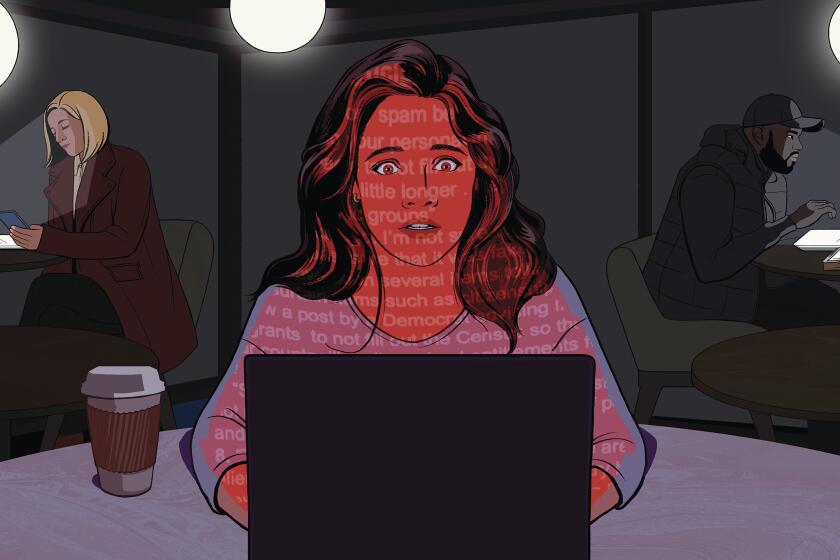
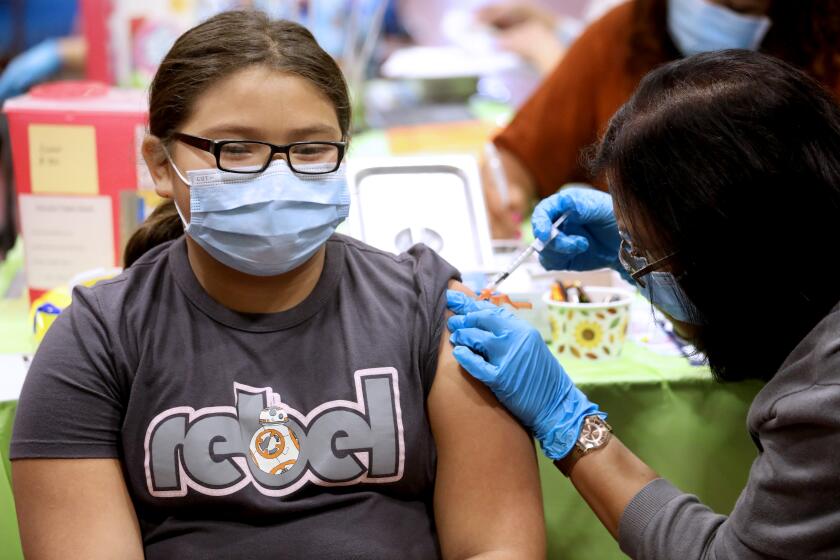










![[20060326 (LA/A20) -- STATING THE CASE: Marchers organized by unions, religious organizations and immigrants rights groups carry signs and chant in downtown L.A. "People are really upset that all the work they do, everything that they give to this nation, is ignored," said Angelica Salas of the Coalition of Humane Immigrant Rights. -- PHOTOGRAPHER: Photographs by Gina Ferazzi The Los Angeles Times] *** [Ferazzi, Gina -- - 109170.ME.0325.rights.12.GMF- Gina Ferazzi/Los Angeles Times - Thousands of protesters march to city hall in downtown Los Angeles Saturday, March 25, 2006. They are protesting against House-passed HR 4437, an anti-immigration bill that opponents say will criminalize millions of immigrant families and anyone who comes into contact with them.]](https://ca-times.brightspotcdn.com/dims4/default/34f403d/2147483647/strip/true/crop/1983x1322+109+0/resize/840x560!/quality/75/?url=https%3A%2F%2Fcalifornia-times-brightspot.s3.amazonaws.com%2Fzbk%2Fdamlat_images%2FLA%2FLA_PHOTO_ARCHIVE%2FSDOCS%2854%29%2Fkx3lslnc.JPG)